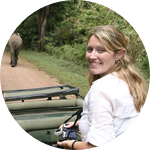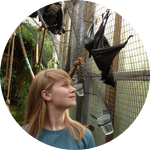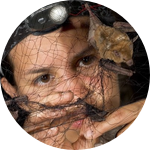About This Project
Livingstone's fruit bats (Pteropus livingstonii) are one of the rarest bats in the world, with only 1260 left in the wild. A captive breeding program of 71 individuals exists as a safeguard against extinction.
Funding would enable the vital investigation of relatedness in captive bats, allowing for the prevention of inbreeding, the assessment of hereditary diseases, the comparison of wild and captive genetics and ensure the continued success of the captive breeding program.
Ask the Scientists
Join The DiscussionWhat is the context of this research?
Livingstone's fruit bats (LFBs) are one of the rarest bats in the world with around 1260 left in the wild. They are classed as a Critically Endangered species on the IUCN red list, just one category away from extinction.
Between 1992-1995, 17 bats were taken into captivity as a safeguard against extinction. There are now 71 bats at Jersey Zoo and Bristol Zoo Gardens but little is known about their relatedness. Pedigree analysis is essential for reducing inbreeding risks and for continuing the successful management of the captive breeding programs. This study will also allow comparison of captive and wild genetics and the investigation of hereditary disease, in order to assess the genetic health of the captive populations.
What is the significance of this project?
True to their name, LFBs are gentle giants that love eating fruit! They are important forest regenerators as they help disperse fruit seeds around the Comoros islands. In recent years, over 45% of the Comoros islands have been transformed into agricultural land meaning that LFBs, and the ecosystem services they provide in seed dispersal, are more important than ever.
This project will improve the fitness of the captive breeding program so that, one day, the future generations can be reintroduced to the wild and help reforest the Comoros. The captive populations also offer valuable opportunities to educate Zoo-visitors about bats and allow study into bat behaviour, which are two important resources in their own right.
What are the goals of the project?
We will produce a genetic family tree, identifying mothers and fathers of offspring by comparing unique genetic fingerprints. These fingerprints are very short DNA sequences that make each animal distinctive. Closely related individuals have more similar sequences.
After I identify individuals and learn how they are related, we can better plan how to breed the captive bats and prevent inherited diseases or traits. The information I produce will also be very useful in comparing the captive bats with those that still remain in the wild.
Together, these two goals will enable us to make the most well informed and effective conservation decisions that could help to ensure the long-term survival of LFBs.
Budget
Your contributions will allow me to complete this project and will cover all the costs related to genetic analysis. Some of the equipment I need to purchase includes laboratory reagents to extract DNA, amplify the target sequences, read the information in a sequencing machine and process the data generated.
The costs of genetic testing ranges from $30-40 per individual, per repeat. I expect to screen almost all 71 living individuals, plus deceased individuals for a total of around 100. Each individual will be screened three times to get the most accurate and reliable results.
Please feel free to contact me for more information on where your donations will go!
Endorsed by
 Project Timeline
Project Timeline
This project will be completed within two years of being funded. It is a main focus of my studies at the University of Bristol and will provide vital information for the management of captive breeding.
Some of the work has already been initiated but cannot be continued until I raise enough funds. I am fully committed to this project and, with your help, I will be able to make a significant contribution in the conservation efforts for the Livingstone’s fruit bat in the near future
Dec 19, 2017
Project Launched
Mar 01, 2018
Extract DNA from all tissue samples
Dec 31, 2018
Process all DNA using PCR
Apr 01, 2019
Analyse PCR results
Meet the Team
Team Bio
Angelica and I are part of the University of Bristol's Bat Ecology and Bioacoustics lab, which is comprised of around ten academics of different career levels and fields of expertise who collaborate and support one another in their quest for bat-based research. In our lab we have geneticists, ecologists, zoologists and climate change scientists, to name a few, all of whom would be happy to help if needed. At the head of our lab group is Professor Gareth Jones.
Sarah Richdon
Since childhood, I have always had a fascination with zoology and the natural world. Whereas some people become inadvertent experts on car models or sports trivia through casual interest, my area of choice was always animals. Starting low-key with various pets, trips to the zoo and a love of natural history programs, this passion for zoology became increasingly prevalent in my career choices as I began to specialise first in biological sciences at A-level and then zoology at BSc Hons level.
With my zoology degree, I quickly gained a part-time job working for Bristol Zoo Gardens which allowed me the time to consider a part-time PhD. For years I was unsure of the topic that my PhD would cover but, after volunteering for 18 months with Bristol Zoo Gardens and working with many of the mammal species present, it was clear that the Livingstone's fruit bats were a high priority.
The Livingstone's fruit bat is a Critically Endangered species, which has currently received very little research attention. This was surprising to me as they are highly social, have a range of interesting vocalisations and are individually identifiable, meaning behavioural study is possible. However, one vitally important project, which I realised would revolutionise their captive breeding program and go a long way to saving the species as a whole, is the production of a family tree or pedigree. Therefore, I signed up to the University of Bristol, UK, with the plan to produce a pedigree analysis for this species, with assistance from my colleague Angelica Menchaca Rodriguez.
As I created my PhD independently, I receive no regular funding and, up to now, I have paid for almost all of my academic fees and expenses using my part-time salary from Bristol Zoo Gardens. This year, I have received so far is £1000 from Bristol Zoo Gardens' staff-development grant towards my academic fees this year (£2,093 for 16/17 academic year).
Angelica Menchaca Rodriguez
Ever since I can remember I have been amazed by mammals. I grew up in a jungle, but not particularly the kind with big trees and wildlife. A jungle of concrete where people often think the only wildlife are pigeons and squirrels. But my vision of the world opened when my family got cable TV and I was able to see the wonders of this world and the amazing work of naturalists like Steve Irwin, David Attenborough and Jane Goodall.
My parents always encouraged me to pursue my dreams, even when the idea of becoming a Biologist was full of stigmas. So, I put my heart and soul into it, joined the largest University in Latin America and graduated as a Biologist. Then, I climbed one step higher and pursued a masters degree in Conservation in another big concrete jungle. But luckily I conducted my research in mind blowing sites, and got to travel to exotic places and encounter wildlife I had never even imagined existed. Today I'm at the peak of my career studies pursuing a PhD degree in Ecology and Evolution of bats.
Bats are the most exciting creatures in this world. They fly, they have extraordinary senses, they are intelligent, they are so diverse and so many interesting questions can be solved by studying them. Bats caught my eye early in my career, and like my first love, they got imprinted on me forever. I have seen my dreams materialize and now I am one step closer to becoming a great scientist that will make a difference in this world.
Additional Information
Fundraiser pledges
All backers will receive a thank you email and a promise to keep you updated on my progress. If you donate the following amounts you will receive:
$25 - Postcard and personalised thank you note
$50 - Printed photograph of a Livingstone's fruit bat at Jersey Zoo
$100 - T-shirt with a photo of a Livingstone's fruit bat at Jersey Zoo
$200 - Two adult tickets to Bristol Zoo Gardens (excludes travel and accommodation)
$500 - An invitation to see the bats, behind-the-scenes at Bristol Zoo Gardens (excludes travel and accommodation)
$1000 - A framed, signed print of the DNA of one of the bats you have helped to sequence - you choose which bat!
$2000 - Acknowledgements in a scientific publication (Individuals only. Companies please contact me directly)
More info
Project Backers
- 163Backers
- 103%Funded
- $10,396Total Donations
- $63.78Average Donation




